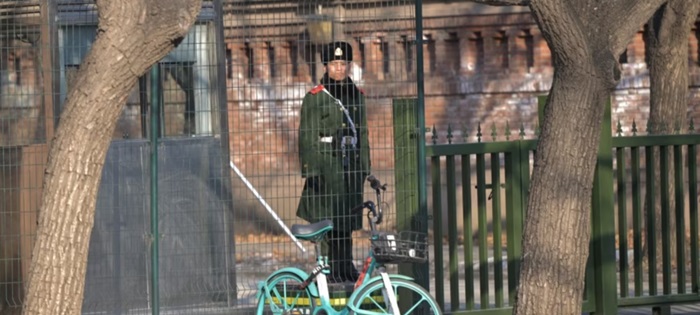
China’s arrest of a man allegedly working as a spy for Britain could be retaliation, analysts say.
The case, which was announced on Monday by China’s Ministry of State Security, comes amid growing and vocal concern in Britain over Beijing and the security threat the communist country poses. It also follows last year’s arrest of a British parliamentary researcher on suspicion of spying for China.
According to a post Monday on the ministry’s official WeChat social media account, Britain’s MI6 intelligence agency recruited a man surnamed Huang in 2015, who has since then passed 17 pieces of intelligence to and recruited personnel for the agency using spy equipment provided by the British government.
Chinese authorities did not reveal Huang’s nationality or gender but said the alleged spy was from an unspecified “third country” and underwent recruitment and training in Britain and other locations. They also said the individual was working under the guise of being an overseas consultant.
The ministry did not provide evidence to support the claims nor disclose Huang’s current condition or whereabouts. But it did say that state security “promptly reported and arranged consular visits, protecting Huang’s lawful rights in accordance with the law.”
When contacted by VOA, Britain’s Foreign Office on Tuesday replied: “It is our longstanding policy to neither confirm nor deny claims relating to intelligence matters.”
Peter Humphrey, a former journalist who later worked for more than a decade as a fraud investigator for Western firms in China, said the case looks like “a complete joke.”
“Firstly, I think this is the continuation of Beijing’s attack on Western consultancies. Secondly, I think Beijing is trying to find a case to throw back at us because we have caught them doing things in the U.K., America, Belgium, etc.,” Humphrey told VOA in a telephone interview. “Beijing is desperately looking for a case to throw back at us.”
The U.S. Department of Justice on Monday said a Chinese American U.S. Navy service member was sentenced to 27 months in prison and ordered to pay a $5,500 fine after pleading guilty in October to taking bribes to give sensitive military information to a Chinese intelligence officer.
Britain has accused Chinese spies of targeting officials in key ministries, while China has unveiled multiple cases accusing foreign citizens, including British and Americans, of espionage.
In September, The Times newspaper reported that Britain’s intelligence agency arrested British parliamentary researcher Chris Cash on suspicion of spying for China. Cash has close ties to Minister of Parliament Alicia Kearns, the current chair of the Foreign Affairs Committee, and Tom Tugendhat, the former defense secretary and security minister.
Another policy researcher working in the British Parliament, who asked to remain anonymous in an interview with VOA because they were not authorized to speak publicly on the issue, said the level of security at parliament has changed since Cash was arrested.
“Within about a month, they changed their entire security protocols. And so now the application process is completely different,” the researcher said, adding that the golden age of British-China relations is dead.
Benedict Rogers, co-founder and chair of the Britain-based rights group Hong Kong Watch, told VOA the accusations made by China not only worsen Sino-British relations but also significantly impact foreign citizens and companies operating in China.
“Whether there is any truth in China’s allegations or whether it is a tit-for-tat retaliation in response to allegations of Chinese espionage activities in Westminster remains to be seen, but either way, this incident contributes to a more risky and dangerous environment for British citizens doing business in or traveling to China,” he said.
David Moore, a policy researcher at the British Parliament, said Britain shouldn’t fear retaliation from the Chinese government.
“About time we need to crack down on Chinese espionage, whether it be trying to infiltrate our institutions or on our streets with Chinese police stations that have been operating across the Western world,” he told VOA referring to alleged policing by Chinese security forces in foreign countries including the U.S. (VOA News)
